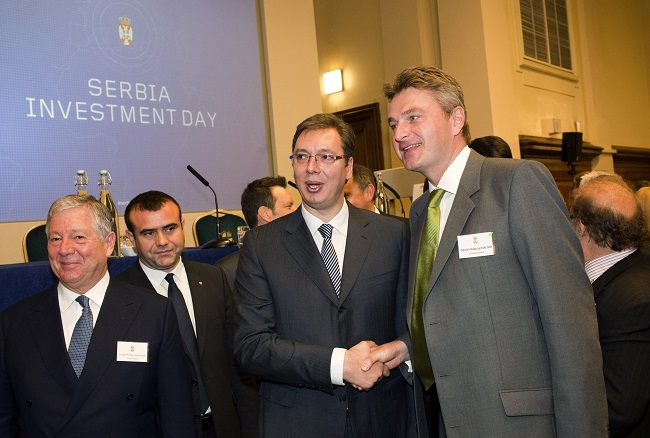 “At the micro level there seem to be many ideas, energy and creativity in every corner of Serbia. Yet, the country is stuck with an obsolete macro development model and lack of credibility from the international community”. Sonja Avlijaš discusses the shortcomings of the recent Serbia Investment Day.
“At the micro level there seem to be many ideas, energy and creativity in every corner of Serbia. Yet, the country is stuck with an obsolete macro development model and lack of credibility from the international community”. Sonja Avlijaš discusses the shortcomings of the recent Serbia Investment Day.

Serbia Investment Day 2014, which took place on 29 October as part of the official visit of the Government of Serbia delegation to London, suffered from three major shortcomings:
- Policy commitments that were presented by the Serbian government produced scepticism among the international investment community.
- Serbia’s inward investment strategy that was presented failed to recognise that replicating other countries’ old industrial models in the rapidly changing world would not work.
- Education policy was conspicuously absent from the discussions.
On incredulous policy commitments
The event’s focus was on Serbia’s government efforts to deliver macroeconomic stability, cut taxes for foreign investors and improve on ‘doing business’ indicators. There was substantial discrepancy between the pledges of the Serbian government and the mistrust from the international community however, which preferred to see evidence of such commitments. Serbia’s 14 places drop in the ‘doing business’ rank over the past year certainly did not match the government’s rhetoric. Furthermore, as a journalist from The Economist Intelligence Unit pointed out, there is an inherent contradiction between promises of lavish investments into infrastructure and subsidies for foreign companies and efforts to tighten the public belt.
Representatives from the World Bank and the HSBC were clear that the current Serbian government has spent enough time on political turbulences and that they needed to focus on showing true commitment to economic reform, including privatisation or liquidation of state owned enterprises and continued macroeconomic stability. The next 12 months would therefore be the true test, according to HSBC’s market economist Agata Urbanska. Wolfgang Fengler from the World Bank issued a warning of the spectre of another lost decade of capitalism looming over Serbia, after the 1990s, if the growth does not recover in the next three years. A businessman I spoke to during the lunch break summarised it succinctly: ‘Serbs are good at leaving impressions, but not traces’. It remains to be seen whether the strong mandate that this government has will be enough to deliver on these promises.
On the unfeasible inward investment strategy
The inward investment strategy presented by the Serbian government at the event strongly resembles the path followed by Central and Eastern Europe (CEE) from the end of 1990s and the early 2000s. CEE engaged in aggressive intra-regional competition to achieve foreign-led re-industrialisation, and, as some authors argue, the political and economic pressures that this development model produced destabilised these countries’ public finances as well as their democracies.
Even if we do not accept the arguments that such a development strategy might have caused economic and political problems in CEE, the question whether that same strategy can be implemented in 2014 remains crucial. The constantly evolving needs of international business make it more difficult for each new country to compete to attract it. We can compare this to the ‘moving target’ of EU conditionality, as identified by Heather Grabbe. Each new country needs to fulfil more conditions in order to join the club, because the EU learns from its past mistakes and raises the bar. As a general rule, such is life for latecomers.
On the conspicuous absence of education
Serbia’s education policy was conspicuously missing from the list of Serbia’s competitive advantages, as presented by the government. Speaking in the name of foreign investors already operating in Serbia, David Banjai from Ball Packaging emphasised the benefits of a well-educated and flexible workforce, but he was also concerned about the deterioration in the quality of education in Serbia and stressed the importance of long-term commitment to education policy. On the other hand, I was under the impression that he was not overly concerned about tax breaks and other financial packages.
We have heard about the importance of education so many times, but the argument somehow always remains obscure as nobody spells out in which way this is exactly important to international business. When it comes to attracting investors, it actually boils down to the following. An ever-greater number of people across the world have gained access to higher education. In parallel, advancement of information technology and programming has led to the rapidly growing global standardisation of services for transnational companies and made it easier for them to monitor their workers and ensure standard service quality across the world. This has led to the growing reliance on the increasingly well-educated labour force in countries with cheaper labour. Therefore, developing countries no longer compete only on cheap low skill labour that works in ‘the world’s sweatshops’.
The proliferation of this phenomenon which has been named ‘digital Taylorism’ over the past decade is continuing to have a negative effect on high skill high wage economies in the West, but it represents a chance for countries with cheaper labour and high skills to capture higher value from foreign direct investment. This is why education matters for foreign investors and this is why any inward investment strategy needs to clearly reflect these global trends. Education matters because no country can afford to ignore the global advances on that front any longer.
Final thoughts
When thinking about a country’s economic development model, it is important to keep in mind that the whole world is currently in the process of rethinking strategies for economic growth, from rethinking the future of low skill jobs amid technological progress, to rethinking the notion of environmental sustainability amid global warming. One cannot have a strategy for the energy sector and not consider sustainability any longer. One cannot attempt to attract foreign investment and ignore the global shifts in demand for skills.
On my last trip from Belgrade I bought ELLE magazine where I read about successful Internet entrepreneurs in Serbia. On my last flight from Belgrade, I spoke to a German owner of a neuroscience consulting company and transferred his operations to Belgrade because of the amazing engineers and creativity he encountered. During the May floods, we witnessed amazing organisational capacities of the people across Serbia. And at the Serbia Investment Day 2014, the most stimulating conversation was taking place on Twitter.
At the micro level there seem to be many ideas, energy and creativity in every corner of Serbia. Yet, the country is stuck with an obsolete macro development model and lack of credibility from the international community. Why do Serbia’s macro development strategies follow superseded textbook development models which threaten to stifle whatever skills, creativity and internal capacities the country has? Resolving this conundrum is, in my humble opinion, the only thing that will ever move the country forward.
Note: This article gives the views of the author, and not the position of LSEE Research on SEE, nor of the London School of Economics.
_______________________
Sonja Avlijaš is a PhD candidate at the European Institute of the LSE and a research associate of the Foundation for the Advancement of Economics (FREN), Belgrade University.
From the Twittersphere
#serbiainvestmentday Beograd na vodi, prezentacija Sinisa Mali pic.twitter.com/KESmyVEsQS
— veselin jevrosimovic (@vjevrosimovic) October 29, 2014
Vujovic: Dodjite. Necemo krsiti zakone zbog vas, ali cemo ih menjati tako da odgovaraju investitorima. #serbiainvestmentday
— Dusan Masic (@dusanmasic) October 29, 2014
MT @Melohina: #Serbia‘s PM @avucic: Just started our path of reforms. @ebrd support is crucial. #serbiainvestmentday pic.twitter.com/gq8uiR0s7D — The EBRD (@EBRD) October 29, 2014
If #millenials arent buying cars, is investment into automobile industry sustainable? http://t.co/b05ptkg23Y #serbiainvestmentday — Sonja Avlijaš (@sonjaavlijas) October 29, 2014



Hi Sonja,
I was also at the Serbia Investment Day but could not recognize some of your comments:
1. You refer to sceptical comments – how did you obtain them. I mingled amongst the delegates but could not get the impression you had.
2. Please explain how the present Serbia’s investment strategy is old fashioned and not fit for 2014.
Hi Avram,
Thank you for your questions. Here are my answers:
1. As I stated in the text, representatives from the HSBC and the World Bank who spoke on the second panel were very explicit about the fact that they wanted to see true commitment rather than promises only. They underlined that 2015 will be the year where the government will have the opportunity to show whether they can move away from political turbulences and conduct the reforms they keep promising they will do. A 14 ranks drop in doing business while claiming to be improving the business environment does seem to reduce the government’s credibility, in the view of many people I have spoken to (not just at this event). Furthermore, another participant of that same panel, David Banjai from Ball Packaging, expressed concern about the dropping educational standards in the country, which I also touch upon in the text. There were also questions from the audience, which included The Economist Intelligence Unit journalist whom I quote. So my conclusions (or rather impressions) come from participants in that particular panel mostly, because the other panels predominantly consisted of Serbian government representatives so I did not find them relevant for understanding the perceptions of the international community. The quote from the businessman I chatted to during lunch is obviously not representative of all delegates, but I never make that claim. I just thought it was an interesting observation that I wanted to share.
2. I think I precisely explain how I find the strategy obsolete in the text. This is what the text is supposed to be about. For one, I am concerned about its resemblance to the strategy pursued by CEE at the turn of the century, and I am wondering whether such a strategy is still feasible today. This is because of many reasons: for example the changing investment landscape due to the current global and European crisis, or the fact these countries encountered serious problems with macroeconomic stability as a result of these policies, etc. I provide a link above to the book that might be of interest as it summarises a lot of the issues CEE encountered. And then I also stress that, in my opinion, the focus in 2014 needs to be a lot more on education than it was in 2000. I explain this through a discussion of changing global business trends, as shown by the emergence of digital Taylorism (I also provide a reference to this concept in the text).
I hope I managed to answer your questions.
Best wishes,
Sonja